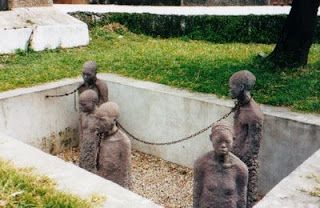To be elected president of Sierra Leone, a candidate must gain at least 55% of the vote. If no candidate gets 55%, there is to be a second-round runoff between the top two candidates.
The current president of Sierra Leone is Ernest Bai Koroma, who was sworn in on 17 September 2007, shortly after being declared the winner of a tense run-off election over the incumbent Vice president, Solomon Berewa of the Sierra Leone People's Party (SLPP).
Ernest Bai Koroma, current president of Sierra Leone
Next to the president is the vice president, who is the second-highest ranking government official in the executive branch of the Sierra Leone Government. The current vice-president is Samuel Sam-Sumana, sworn in on 17 September 2007.
Samuel Sam-Sumana
The Sierra Leone Supreme Court in Freetown is the highest and most powerful court in the country.
Sierra Leone Supreme Court
Since independence in 1961, Sierra Leone's politics has been dominated by two major political parties, the Sierra Leone People's Party (SLPP), and the ruling All People's Congress (APC), although other minor political parties have also existed but with no significant supports.
The judicial power of Sierra Leone is vested in the judiciary, headed by the Chief Justice and comprising the Sierra Leone Supreme Court, which is the highest court in the country and its ruling therefore cannot be appealed; High Court of Justice; the Court of Appeal; the magistrate courts; and traditional courts in rural villages. The president appoints and parliament approves Justices for the three courts. The Judiciary have jurisdiction in all civil and criminal matters throughout the country. The current Sierra Leone's Chief Justice is Umu Hawa Tejan Jalloh, who was appointed by President Ernest Bai Koroma and took office on 25 January 2008 upon her confirmation by parliament. She is the first woman in the history of Sierra Leone to hold such position.
The judicial power of Sierra Leone is vested in the judiciary, headed by the Chief Justice and comprising the Sierra Leone Supreme Court, which is the highest court in the country and its ruling therefore cannot be appealed; High Court of Justice; the Court of Appeal; the magistrate courts; and traditional courts in rural villages. The president appoints and parliament approves Justices for the three courts. The Judiciary have jurisdiction in all civil and criminal matters throughout the country. The current Sierra Leone's Chief Justice is Umu Hawa Tejan Jalloh, who was appointed by President Ernest Bai Koroma and took office on 25 January 2008 upon her confirmation by parliament. She is the first woman in the history of Sierra Leone to hold such position.
Umu Hawa Tejan Jalloh
By Daiane Freire





